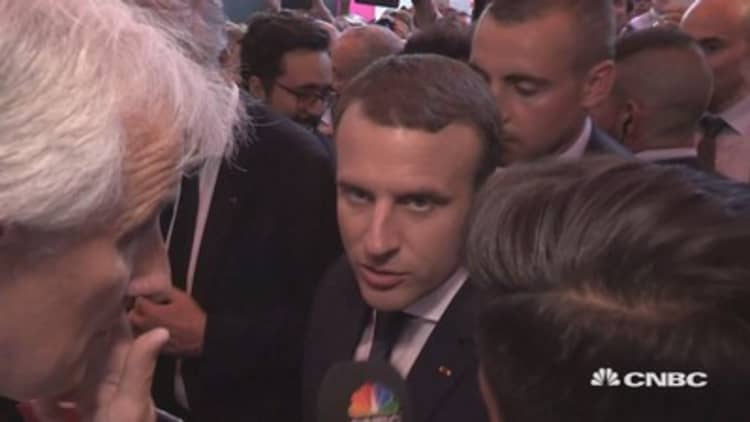When French telecom billionaire Xavier Niel launched his new start-up incubator last month, President Emmanuel Macron attended the opening ceremonies in Paris and delivered a rousing speech to the 2,000 attendees.
Macron's participation was a measure of Niel's clout and also proof that his ambition to make France a leader in technology innovation coincides with the 39-year-old Macron's vision for his country. "Transform our country; shake it up; change it!" the new French president urged an adoring crowd.

The vast, vaulted 360,000-sq.-ft space, in a former train depot renamed Station F, will be the largest incubator in the world, housing 1,000 start-ups and 3,000 work spaces for entrepreneurs, consultants and investors.
Niel, whose wealth is estimated at $9.1 billion by Forbes, owns 55 percent of Iliad, the publicly traded communications company he founded in 1990 to provide cut-rate internet, telephone and television service under the Free brand. He has personally invested 250 million euros ($285 million) in Station F. "The bigness comes from Xavier," says Silicon Valley native Roxanne Varza, director of Station F. "All his projects have this theme of being hyper-ambitious."
More from iCONIC:
Billionaire founders share No. 1 secret on how to succeed on your own
Why this convicted felon was handed a million-dollar business
'Bad' frozen food's plan to go good with help of celebrity-backed start-up
Station F is aiming to accelerate innovation in France, which is gaining on perennial leaders such as the United Kingdom and Israel, in the creation and funding of new tech start-ups. According to the website Tech.eu, which tracks venture capital investment in Europe, French start-ups raised 2.72 billion euros ($3.12 billion) in 2016 versus 3.21 billion euros ($3.68 billion) in the UK and 2.77 euros ($3.18 billion) in Israel (which is counted as part of Europe).
Source: Tech.eu
There are already dozens of incubators and accelerators in France, including the well-known 104 Factory and Le Hub BPI France. The point of putting hundreds of start-ups in close proximity is to generate an ecosystem that will trigger interactions — and hopefully winners, says Varza. "Most start-ups solve their problems by consulting another start-up. With the sheer quantity of start-ups on campus, we should have a lot to help entrepreneurs."
Developing a start-up ecosystem
Station F will attempt to meet all the needs of entrepreneurs. It will provide space to investors, 3-D printers and a 24-hour restaurant (open to the public). Twenty-seven companies, including Microsoft, Facebook, Amazon Web Services, Zendesk and French online retailer Vente-Privée will operate their own accelerator programs for companies they select. Niel's strong commitment to diversity is also evident in the range of entrepreneurs recruited for Station F. He has set up a Fighters Program that will help aspiring entrepreneurs from disadvantaged backgrounds get their companies off the ground.
Benoit Bergeron, a French serial entrepreneur and investor, says Station F will play a dual role. "It's an extraordinary boost, not just for France's external image, it also gives French entrepreneurs more confidence."
Station F is benefiting from a real cultural change, says Varza. "Everyone (in France) wants to be an entrepreneur." The incubator may also benefit from political uncertainties elsewhere, like Brexit, with the possibility that U.K.-based start-ups will be cut off from Europe. Varza says entrepreneurs from 50 countries applied for the program; predictably, the United States was first, but Great Britain was second. "Many of the U.K. applicants mentioned Brexit."
A sampling of start-ups enrolled in Station F disclosed a wide variety of companies. Manant Maheshwari's company, GuestReady, is one of 200 selected for Station F's Founders Program. The London-based start-up by two Swiss, a Brit and a Frenchman, acts as a concierge for short-term rentals such as those listed on Airbnb. Maheshwari, the global marketing manager, says his company will clean up, change the linen and meet arriving and departing guests. The company raised $750,000 last November from the Swiss Founders Fund.
If the synergy at Station F works as it should, Manant will eventually meet Timothée Maucor of MyLoby, which is a French start-up setting up a digital lockbox system for storing keys in bars, restaurants and stores. A user could leave a spare key in case of an emergency or for a guest. Users verify their identity and open the lockbox using a mobile app.
Not all the start-ups at Station F are digital technology companies. Shirley Billot's Kadalys makes natural organic cosmetics using banana peels she acquires in quantity from her native Martinique in the French Caribbean. Blakata, founded by Elounda Mayabouti, manages shipments of parcels from France to West Africa.
For years France had a reputation for starting companies but not being able to grow them big enough to exit. "The reality is the French don't know how to do sales and marketing," says venture capitalist Rodrigo Sepulveda Schulz, managing partner at Luxembourg-based Expon Capital. "They prefer to focus on the product. It's part of the culture."
But he concedes that is changing, and Station F could help. It could be the French equivalent to University Avenue in Palo Alto, which unites start-ups with VCs and consultants. French unicorns (valued at $1 billion or more) are emerging, such as BlaBlaCar, a long-distance carpooling service; OVH, a cloud storage and hosting service that raised 400 euro million in debt financing last month and Devialet, a maker of high-end speakers that recently raised $100 million from investors, including hip-hop mogul Jay Z.
For years one of the great French success stories was Business Objects, a business analytics software company acquired by SAP for $6.8 billion in 2008. Another was games publisher Ubisoft, a publicly traded company that is currently trying to fend off a takeover by Vivendi.
If Station F helps companies grow, more French start-ups could join the pantheon of successful exits.
— By Joel Dreyfuss, special to CNBC.com




